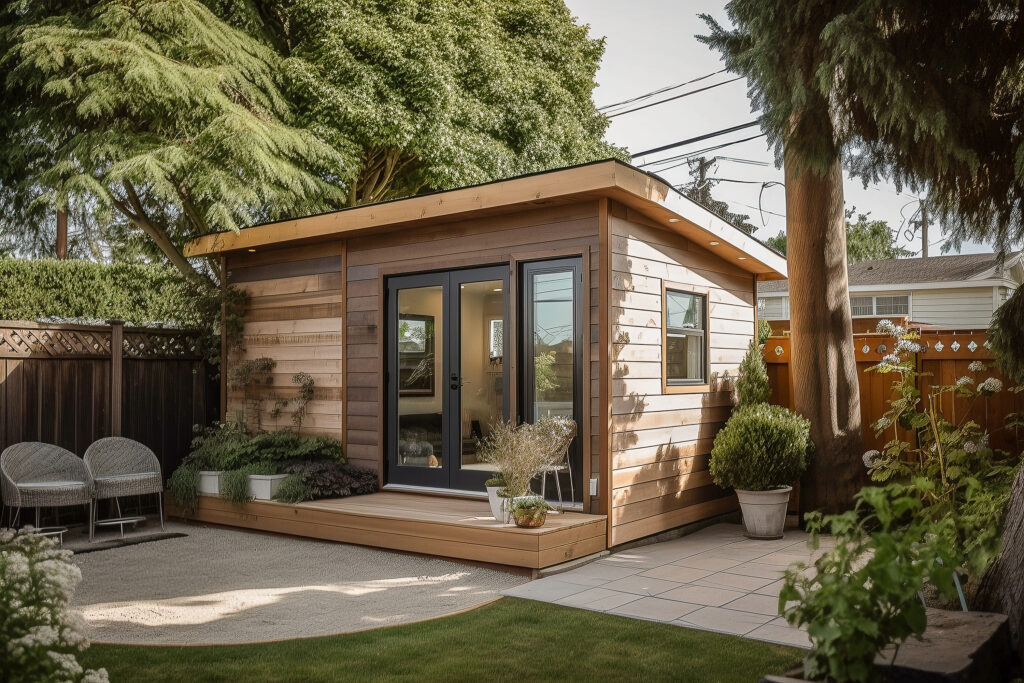Welcome to our page dedicated to Accessory Dwelling Units (ADUs), an emerging trend in the housing and construction industry. We’ve brought together a variety of information and resources to help you better understand ADUs and how they might fit into your building plans.
What is an Accessory Dwelling Unit (ADU)?
An ADU is a secondary living space on a property that has its own living, sleeping, cooking, and bathroom facilities. This can be a standalone structure like a tiny house, a unit above a detached garage, or a portion of the main house that has been sectioned off.
The Benefits of ADUs
ADUs offer several advantages, including adding value to your property, providing an affordable housing solution, facilitating multi-generational living, and potentially generating additional income through rent.
Regulatory Framework
ADUs are regulated by local zoning laws, which vary by location. They are subject to specific requirements regarding their size, location, and use. For information specific to the City of Tampa, please refer to our Tampa-specific ADU resource.
In-Depth Resources
To help you delve deeper into the world of ADUs, we’ve compiled several valuable resources:
- U.S. Department of Housing and Urban Development ADU case study: Detailed case studies exploring the implementation and impact of ADUs across the U.S.
- American Planning Association ADU information: Comprehensive guide on ADUs, including planning and zoning considerations.
- Florida Housing Coalition ADU information: Florida-specific information on ADUs, including regulatory framework and implementation strategies.
- AARP ADU information: Explore how ADUs can facilitate aging in place, with a wealth of resources including policy considerations, benefits, and case studies.
Whether you’re a homeowner considering adding an ADU to your property, a contractor looking to expand your services, or a designer keen to incorporate ADUs into your portfolio, we hope you’ll find these resources helpful and informative.
Additional Resource: Building Your Dream Space
If you’re looking for more comprehensive guidance on home additions and transformations, check out our eBook – “Building your Dream Space: A Homeowner’s Guide to Planning and Constructing Home Additions“. This resource covers everything from budgeting and finding the right contractor to obtaining permits and overseeing construction, making it the perfect companion for your ADU project.
We encourage you to explore and get in touch with us if you have any questions or need professional assistance with your ADU project.

Understanding Accessory Dwelling Units in the City of Tampa
The City of Tampa offers a unique solution to housing needs with the concept of Accessory Dwelling Units (ADUs) and Extended Family Residences (EFRs). They provide a flexible and affordable housing option while also allowing homeowners to make better use of their properties.
What Are Accessory Dwelling Units and Extended Family Residences?
An Accessory Dwelling Unit (ADU) is a secondary dwelling with its own independent kitchen, sanitary, and sleeping facilities on the same property as a primary residence. They can manifest in various forms including a freestanding structure (like a tiny house), a second-level dwelling above a detached garage, or a smaller secondary dwelling within the primary residential building.
On the other hand, an Extended Family Residence (EFR) is similar to an ADU, with some key differences in requirements. Unlike ADUs, EFRs are designed to be used exclusively by extended family members.
Where are ADUs and EFRs Permitted?
The regulations for ADUs and EFRs vary in the City of Tampa. EFRs are permitted citywide as a Special Use, subject to certain criteria and conditions. ADUs, on the other hand, are permitted only within specific zoning districts and particular geographic areas of the city, also as a Special Use. Both types of dwellings, if not part of the primary structure, must also meet the requirements for Accessory Structures.
Comparing ADUs and EFRs
While both ADUs and EFRs provide additional living space on a property, there are some distinct differences between them:
- Size: An ADU can be up to 950 sq. ft., while an EFR has a maximum size of 600 sq. ft.
- Parking: Off-street parking is required for an ADU, but not for an EFR.
- Ownership: The primary dwelling must be owner-occupied for both ADU and EFR.
- Rental: An ADU can be rented separately, while an EFR cannot.
- Occupancy: An ADU is not limited to family members only, whereas an EFR is.
- Maximum Occupants: Both ADU and EFR can have a maximum of 2 occupants.
- Utility Meters: An ADU requires separate utility meters, an EFR does not.
- Annual Review: Both ADU and EFR are subject to an annual review of Special Use Permit & Criteria.
ADUs and Short-Term Rentals (less than 1 week)
Current state law prevents local governments from passing new ordinances regulating short-term rentals, thus ADUs cannot be used for such purpose in the City of Tampa.
Impacts on Property Taxes and Insurance
Building an ADU or EFR may have implications for property taxes, homestead exemption, and homeowner’s insurance. Homeowners should consult with the Hillsborough County Property Appraiser’s Office for property tax related inquiries and their insurance providers about potential impacts on their policies.
In summary, ADUs and EFRs provide versatile housing options in the City of Tampa. It is crucial to understand the specific regulations and requirements in order to take full advantage of these unique housing options.

